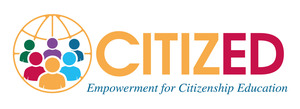CITIZED (2020–2023)

Policy Implementation support and teacher empowerment for CITIZenship EDucation
The CITIZED project aimed to contribute to closing the gap between policy statements and daily practice in schools through policy recommendations, teacher training modules and tools for democratic school development.
- The project developed an innovative toolkit to support the broad implementation of citizenship education in European secondary schools, for the benefit of all students and especially those at risk of discrimination or social exclusion.
- CITIZED developed broad networking activities to support educational policies that emphasise the acquisition of social and democratic competences.
- The training modules were developed in a participatory process together with teachers, and the handbook was tested in eleven pilot schools in three countries.
- The central anchor point of the activities was the Reference Framework of Competences for Democratic Culture of the Council of Europe.
The final event of the project took place during the Lifelong Learning Week 2023 in Brussels.
Results of the project:

